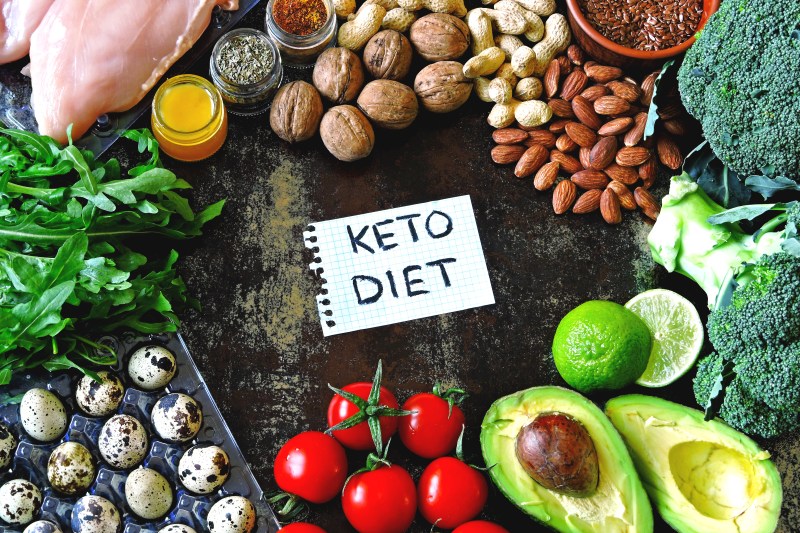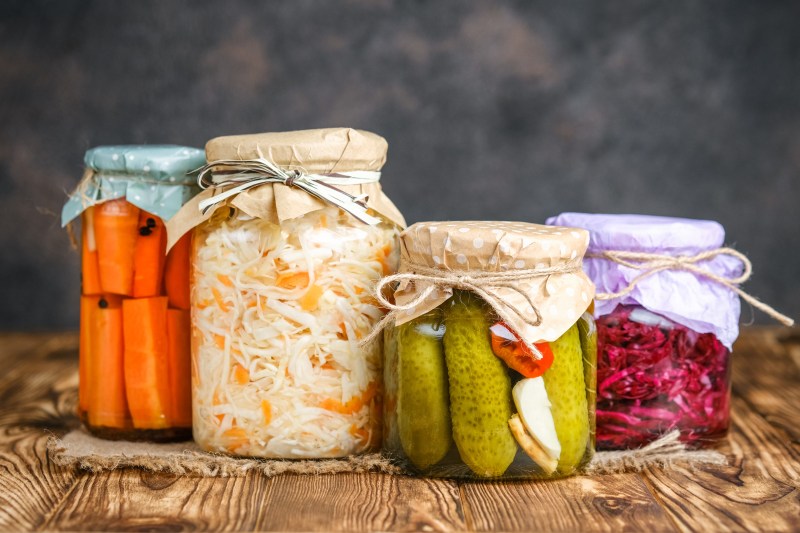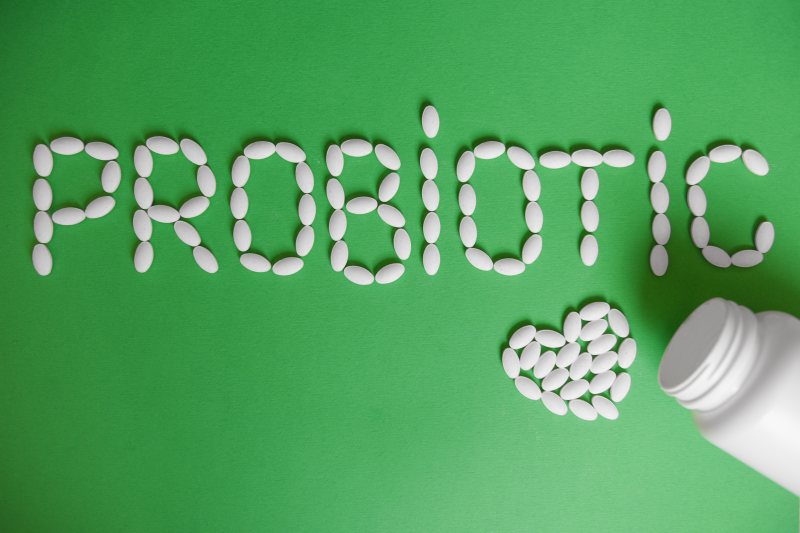Probiotics promote a healthy gut microbiome linked to digestive health and metabolic balance, and taking probiotics may be especially beneficial for individuals on the ketogenic diet.
Here’s why you should consider taking probiotics on keto and what to look for when choosing a probiotic supplement.
What are probiotics?
Probiotics are live microorganisms such as bacteria and yeasts that naturally reside in the human digestive system and contribute to the composition of your gut microbiota.
These microorganisms, often called beneficial bacteria, promote diverse intestinal microflora. The diversity of microbes in your gut is crucial for healthy immune system function, metabolic balance, and digestion.
Research published in Therapeutic Advances in Gastroenterology suggests that “Our gut harbors a complex community of over 100 trillion microbial cells, which influence human physiology, metabolism, nutrition, and immune function.”
Probiotics promote microbial diversity, which helps prevent the overgrowth of potentially bad bacteria associated with various health issues, including ulcerative colitis, irritable bowel syndrome (IBS), food allergies, depression, and skin conditions.
To be classified as a probiotic, a microbe must be alive when consumed, linked to health benefits, and safe for human consumption.
While there are thousands of different microbial strains in the human gut, some of the most beneficial probiotic microorganisms include Lactobacillus strains, Bifidobacterium species, and yeasts such as Saccharomyces boulardii, Saccharomyces cerevisiae.
Probiotics occur naturally in fermented foods or can be obtained from dietary supplements in the form of capsules, powders, or liquids.
Watch the video below to discover which fermented foods you can eat on keto.
Can you take probiotics on keto?
Yes, you can take probiotics on keto.
While probiotics are helpful for many people, those on a high-fat diet may particularly benefit from increasing gut microbe diversity with probiotic supplements.
What you eat can have a significant impact on the composition of your microbiome, and increasing dietary fats naturally promotes the growth of certain beneficial bacterial strains that thrive on lipids and fatty acids, such as Firmicutes phylum.
Probiotics help maintain a healthy balance of microbes, which is crucial for digestive health and strong immune defenses, and taking probiotics supplements may keep common keto challenges such as keto flu at bay.
Some people on ketogenic diets, particularly those who don’t follow a nutritious keto diet like Healthy Keto®, tend to not consume enough dietary fiber, the primary energy source of beneficial bacteria.
A lack of adequate fiber intake on keto can cause an imbalance of intestinal microflora. This can lead to the overgrowth of potentially harmful bacteria linked to unpleasant digestive symptoms, chronic inflammation, Candida infections, poor immune function, and a higher risk of colon cancer.

Benefits of probiotics on keto
The benefits of probiotics have been extensively studied and reach far beyond digestive and immune health.
A study published in Frontiers of Microbiology suggests that probiotic bacteria and yeasts help regulate blood sugar balance, support weight loss, and improve metabolic health. These benefits make probiotics an excellent addition to the ketogenic diet.
Here are five benefits of probiotics on keto.
1. Strong immune system function
Evidence published in the Journal of Microbiology, Immunology, and Infection found that probiotics play a crucial role in regulating the production and activity of immune cells.
A healthy microbiome enhances your immune system’s ability to prevent infections, detect and eliminate potential abnormal and carcinogenic cells, and lower the risk of autoimmune diseases.
These findings have been confirmed by a study published by the British Medical Journal that found that Lactobacillus GG supplementation lowers the frequency and severity of upper respiratory tract infections by almost 20 percent.
2. Support metabolic health
Many people follow a keto diet to improve their metabolic health. Probiotics are closely linked to various metabolic benefits, making them an excellent addition to the ketogenic lifestyle.
Beneficial gut bacteria ferment certain foods, which generates large amounts of short-chain fatty acids (SCFAs). SCFAs stimulate the secretion of glucagon-like peptide-1 (GLP-1), an essential hormone needed for balanced insulin control and glucose metabolism.
Research published in Diabetology and Metabolic Syndrome found that Lactobacillus, Bifidobacterium, and Clostridium species can improve insulin resistance, a critical marker of metabolic health.

3. Weight loss
A study published in Nutrients suggests that beneficial bacteria affect the production and regulation of various hormones needed to regulate appetite, satiety, and energy metabolism, which plays a crucial role in weight management.
The authors of the same study found that certain strains of Lactobacillus, such as Lactobacillus acidophilus, Lactobacillus plantarum, and Lactobacillus bulgaricus, showed significant weight-loss effects, especially if taken in combination with Bifidobacterium species.
The relationship between a diverse intestinal microflora and balanced appetite-regulating hormone production may also explain the benefits of probiotics for sugar cravings linked to weight loss and weight maintenance.
4. Enhanced fat digestion
Friendly gut microbes recycle bile salts needed for the breakdown and absorption of fats and fat-soluble vitamins, which is particularly beneficial if you are doing keto.
When gut microbes interact with bile released during digestive processes, bile salts undergo conjugation, a chemical process that increases their solubility and allows their reabsorption into the enterohepatic circulation.
“More than 90 percent of bile salts are recycled by the gut microbiome,” explains Dr. Berg. “Probiotics can play a significant role in promoting proper fat digestion and nutrient absorption.”
5. Promote nutrient absorption
In addition to enhancing the body’s ability to absorb fat-soluble vitamins, beneficial bacteria can produce vitamin K2 and B vitamins, including vitamins B1, B2, B3, B5, B5, B7, B9, and B12.
Research published in Current Opinions in Biotechnology found that strains of Bifidobacterium appear to generate the most significant amounts of vitamins within the human digestive tract.
Maintaining optimal levels of B vitamins on keto promotes fat burning and can help avoid symptoms of the keto flu, such as fatigue, headaches, and irritability.

Best sources of probiotics on a keto diet
Fermented foods provide an optimal environment for healthy bacteria to grow and proliferate, which explains why fermented foods are the best natural source of probiotics.
However, not all fermented foods are keto-friendly, and it’s crucial to avoid those with a high carb count, such as yogurt, dairy-based kefir, and some kombucha teas, to maintain ketosis.
Here are some of the best keto-approved sources of probiotics:
- Sauerkraut
- Tempeh
- Kimchi
- Natto
- Miso
- Cheese
- Kefir (water-based)
Probiotics are also widely available as dietary supplements and a safe and highly effective way to increase your gut bacteria diversity.
How to find a quality probiotic supplement
To maximize the health benefits of probiotic supplementation, it’s crucial to choose a high-quality probiotic supplement that contains a variety of well-researched microbes, such as Lactobacillus and Bifidobacterium strains.
It’s equally as important to opt for a high-potency supplement that contains at least 60 billion colony-forming units (CFU), a measure of how many viable live microbes are present in each serving.
Taking probiotics with less than 60 billion CFU per serving may not deliver adequate amounts of beneficial microbes into the gut.
In addition, it’s recommended to take probiotics packaged in a delayed-release capsule to ensure the survival of probiotics during their passage through the stomach acid.
A high-quality liquid probiotic supplement is an ideal option for individuals who prefer not to take pills or capsules.
While most probiotics supplements don’t contain carbohydrates, it’s essential to check the label for fillers or other added ingredients that may contain carbs.

Prebiotics vs. probiotics
While probiotics are live microorganisms, prebiotics are non-digestible fibers that serve as food for beneficial microbes and contribute to a diverse microbiome.
Gut bacteria convert non-digestible fiber into SCFAs, the primary fuel source for intestinal microbes.
SCFAs are essential for a healthy microbiome and have been linked to many health benefits, including overall gut health, lowering inflammation, and supporting metabolic health associated with a lower risk of insulin resistance and type 2 diabetes.
Keto-friendly prebiotics
Regularly consuming prebiotics promotes the health and proliferation of good bacteria residing in your gut and enhances the benefits of taking probiotics supplements.
There are several keto-friendly foods rich in prebiotic fiber, including:
- Asparagus
- Garlic
- Jerusalem artichokes
- Onions
- Leeks
- Flaxseeds

Key takeaways
Probiotic foods and supplements promote a balanced and diverse intestinal microflora, which is vital for digestive, immune, and metabolic health.
Taking a probiotic supplement containing Lactobacillus and Bifidobacterium strains on a keto diet can help boost immune defenses and weight loss, improve metabolic health and fat digestion, and may lower the risk of keto flu symptoms.
Additional resources
- How to properly store your probiotics
- Optimal time for your body to benefit from the helpful bacteria
- Probiotics for fungal acne
FAQ
1. Are probiotics keto-friendly?
Yes, you can take probiotics while on a keto diet.
Probiotics promote a diverse intestinal microbiome, which is linked to strong immune defenses and digestive health and has been found to support metabolic balance and weight loss.
2. What are the best probiotics for fat loss?
Evidence suggests that certain strains of Lactobacillus, such as Lactobacillus acidophilus, Lactobacillus plantarum, and Lactobacillus bulgaricus, enhance weight loss, especially if taken in combination with Bifidobacterium species.
3. What are the best sources of probiotics while on a keto diet?
The best natural sources of probiotics on keto are fermented foods such as sauerkraut, natto, miso, tempeh, kimchi, cheese, and water-based kefir.
4. Are there carbs in probiotic pills?
Most probiotic supplements don’t contain carbs. However, it’s crucial to check product labels for potential carb-containing fillers or other additives.
5. Can probiotics help with keto diarrhea?
Yes, probiotics can help with keto diarrhea.
Keto diarrhea is often linked to poor dietary fat absorption, and probiotics can enhance fat digestion by recycling bile salts, which play a crucial role in the proper breakdown and absorption of dietary fats and fat-soluble vitamins.
6. How can I boost my immune system on a keto diet?
Taking probiotics on keto promotes a diverse intestinal microflora, which plays a fundamental role in regulating the production and activity of immune cells. Probiotics can support your body’s natural ability to fight microbial infections, eliminate abnormal and potentially carcinogenic cells, and lower the risk of autoimmune diseases.
7. Do probiotics contain sugar?
While probiotics themselves don’t contain sugar, some supplements may have added ingredients that contain sugar to enhance their taste or texture.
It’s essential to check the product label when selecting supplements on keto to avoid sugar-containing probiotics.
8. Do probiotic pills have calories?
Probiotics don’t contain calories. However, some probiotic supplements are made with fillers and additives and may contain small amounts of calories.
9. Can I take supplements while on a keto diet?
Yes, you can take keto supplements on a keto diet. Carefully check product labels and avoid supplements that contain carbs or sugars that could potentially push you out of ketosis and affect fat burning.
10. Can going keto improve gut health?
Evidence suggests a link between keto and gut health. The ketogenic diet has been found to impact the microbial composition of the microflora and promote the growth of beneficial bacteria.
A high-fat, low-carb diet can also lower inflammation, which has beneficial effects on gut health and lowers the risk of gastrointestinal inflammatory conditions such as Crohn’s disease and inflammatory bowel disease.
Sources
- https://pubmed.ncbi.nlm.nih.gov/23814609/
- https://www.ncbi.nlm.nih.gov/pmc/articles/PMC10470842/
- https://pubmed.ncbi.nlm.nih.gov/25304268/
- https://www.ncbi.nlm.nih.gov/pmc/articles/PMC32161/
- https://www.ncbi.nlm.nih.gov/pmc/articles/PMC7656736/
- https://www.ncbi.nlm.nih.gov/pmc/articles/PMC8540110/
- https://www.sciencedirect.com/science/article/abs/pii/S095816691200119X








